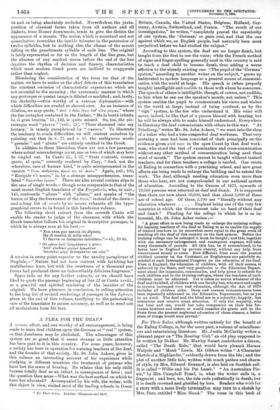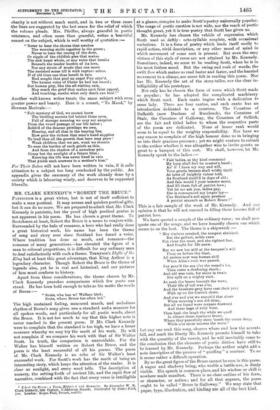A PLEA FOR THE DEAF.*
A STRONG effort, and one worthy of all encouragement, is being made to train deaf children upon the German or " oral " system, so that dumbness may be abolished. The advantages of this system are so great that it seems strange so little attention has been paid to it in this country. For some years, however, a society has been in operation for training teachers of the deaf, and the founder of that society, Mr. St. John Ackers, gives in this volume an interesting account of his experience while studying in different countries the treatment of persons who have lost the sense of bearing. He relates that his only child became totally deaf as an infant, in consequence of fever ; and the question then arose—What was the beet method on which to have her educated ? Accompanied by his wife, the writer, with this object in view, visited most of the leading schools in Great * For Their Sakes. London : Chapman and Hall.
Britain, Canada, the United States, Belgium, Holland, Ger- many, Austria, Switzerland, and France. " The result of our investigations," he writes, "completely proved the superiority of one system, the German,' or pure oral, and that the one against which we, as English people, bad naturally been most prejudiced before we had studied the subject."
According to this system, the deaf are no longer dumb, but taught from the first to use the voice; while the French method of signs and finger-spelling generally used in this country is said to teach a deaf child to become dumb, thus adding a worse affiction to the already existing one. "The pupil of the' German' system," according to another writer on the subject, "grows up
habituated to spoken language as a general means of communi- cation with the world at large. His speech is (when properly taught) intelligible and audible to those with whom he converses.
The speech of others is intelligible, though, of course, not audible, to him when he can see the speaker's mouth, not unless." This system enables the pupil to communicate his views and wishes to the world at large, instead of being confined, as by the " sign " system, to the few who understand it. His voice will never, indeed, be like that of a person blessed with hearing, but he will be always able to make himself understood. Everywhere in Germany the deaf communicate with others in this way. " At Friedberg," writes Mr. St. John Ackers, " we went into the shop of a baker who had a toto-congenital deaf workman. That very morning a man had been convicted of theft principally on the evidence given vivei, voce in the open Court by that deaf work- man, who stood the teat of examination and cross-examination without any other method of communication being used than
word of mouth." The system cannot be taught without trained teachers, and for these teachers a college is needed. One exists at Ealing in connection with a practising school, and now great efforts are being made to enlarge the building and to extend the work. The deaf, although needing education even more than those who hear, are not comprehended in our national system of education. According to the Census of 1871, upwards of 19,000 persons were returned as deaf and dumb. It is supposed
that there are now about 30,000, and that about 5,000 of these are of school age. Of these, 2,700 are "literally without any education whatever England being one of the very few countries in which the Government take no heed of their deaf and dumb." Pleading for the college in which he is so in. terested, Mr. St. John Acker writes
"A great effort is now being made to enlarge the training college for learning teachers of the deaf at Ealing so as to enable the supply of trained teachers to be somewhat more equal to the great work of teaching all the deaf of this country on the best system. Before the training college can be enlarged it must be bought ; 'and this, together with the necessary enlargement and consequent expense, will take many thousands of pounds. All this has, be it remembered, to be borne here in England by private charity, without any help from Government money or rates. How different from even the poorest civilised country on the Continent, as Englishmen arepainfully re- minded at each International Congress on the education of the deaf. Even in England, the education of children, with all their senses, is enforced by the State, and very particular is the Education Depart- ment about the inspection, examination, and help given to schools for such children and to the training colleges, where the teachers of such children must be educated. Yet it takes no notice whatever of the deaf and the blind, of children with one faculty lost, who want and ought to receive increased care and education, although the Act of 1870 includes all children alike. Deep and earnest remonstrances have been repeatedly addressed to the Education Department, but as yet to no avail. The deaf and the blind are in a minority, happily, but minorities now receive scant attention. If only the majority, who can hear and see, would but take compassion on their less for- tunate brothers and sisters, or would consider the grave evil to the State from the present neglected education of these classes, a better state of things would soon prevail."
For Their Sakes, although written entirely for the benefit of the Ealing College, is, for the most part, a volume of miscellane-
ous and entertaining literature. Mr. Justin McCarthy writes a pleasant paper on " The Roaring Girl," an old play supposed to be written by Dekker. Mr. Hawley Smart contributes a dream, called "The Death Ride," that would have pleased Horace Walpole and " Monk " Lewis. Mr. Gibbon writes " A Character Sketch of a Highlander," evidently drawn from the life ; and-the plot of another little tale, written with much pathos and charm of style, by Mrs. Edward Kennard, is also laid. on Scottish soil. It is called " Willie and his Pet Lamb." " An Australian Pic- nic," by Mrs. Campbell Timed, is, what the writer calls it, a fragment ; and here, too, the tale ends pathetically in death, but it is death crowned and glorified by love. Readers who wish for a story with a more lively termination may tarn to a sketch by Mrs. Parr, entitled "Miss Hazel." The verse in this book of charity is not without much merit, and in two or three cases -the lines are suggested by the lost sense. for the relief of which the volume pleads. Mrs. Pfeiffer, always graceful in poetic utterance, and often more than graceful, writes a beautiful sonnet on the subject, which is well worthy of quotation :-
" Never to hear the chorus that awakes
The morning strife together in the grove; Never to hear the cooing of the dove, Or ripple of the childish glee that makes The sick heart whole, or any voice that breaks Beneath the tender burden of its love, Nor any strain of music that can move The ravished sense till it with rapture aches. If of old time one thus bereft in vain Had sought that pool an angel Pity stirr'd, The human voice of Christ he had not heard ; Bat human pity, like the all-visiting rain, May reach the grief that makes such faint appeal, And touching, soothe what only death can heal !"
Another well-known writer treats the same subject with even greater power and beauty. Here is a sonnet, " To Maud," by Herman Merivale :—
" Fair mystery of God, we cannot know The thrilling secrets hid behind thine eyes, Full of strange meaning we may not surprise From the vexed passage of our life below ; Robb'd of the dearest privilege we owe, Hearing, and all that in the hearing lies, How poor the richest that man's hand supplies To lend thee all the growth that here may grow ! Weak children that we are, weak we remain
To ease the burden of such griefs as this, And from the shadow of a nameless pain Grasp but the sunlight of a future bliss ; Knowing the life was never lived in vain That yields such answers to a mother's kiss."
For Their Sakes will not.have been written in vain, if it calls attention to a subject too long overlooked by the public. An appendix gives the summary of the work already done by a society which is labouring wisely, and deserves to be supported liberally.















































 Previous page
Previous page